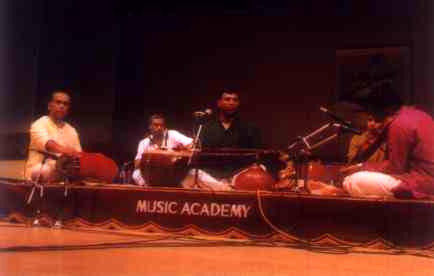![]()
RAVIKIRAN ENTHRALLS AT MUSIC ACADEMY

Right from the word go, Ravikiran was in full form. The popular Sahana Varnam 'Karunimpa' gave a bright start to the concert. The next item, 'Ennadujutuno', a relatively rare Tyagaraja kriti in raga Kalavati (a janya of Chakravakam) was rendered in such a way that one could not only appreciate the music of Ravikiran but also the greatness of the composer, who has shown an amazing versatility in handling such small ragas. Varali was the next on the agenda and Ravikiran's handling of it was beautiful. Dikshitar's 'Seshachalanayakam' with neraval and kalpanaswaras at 'Aravinda patranayanam' was marked by intelligent laya intricacies.
'Enraikku sivakripai' in Mukhari, an emotive song, was rendered with sensitivity by Ravikiran. The accompanists could have done better though, and enhanced the effect with pregnant pauses. Ravikiran followed it up with an alapana of Neelambari, rich in raga bhava and full of melody and aesthetics. Ponniah Pillai's not very popular kriti 'Amba neelambari' was a welcome feature which Ravikiran presented in all its majesty and grandeur.
After a brisk 'Manasuloni' in Suddhahindolam (or Varamu as it is known these days), he took up the main raga Kalyani. It is not known how Chatusruti Daivata has crept into Hindolam and other ragas like Hindolavasantam, which have been listed in ancient texts as janyas of Natabhairavi. The alapana of Kalyani and the subsequent Tanam in the ghana raga panchaka (Nata, Gowla, Arabhi, Varali - Ravikiran rendered Vijayasri instead since he'd already played Varali earlier - and Sriraga) received excellent treatment in his hands. The Tanam was particularly enjoyable as was evident in the thunderous applause that it received. He chose a mridanga-yati Pallavi in Adi tala, Misra gati (Parimala rangapate mam pahi) which he announced as his father and guru, Chitravina Narasimhan's creation. His rendering of kalpanaswaras, with a 13-akshara koraippu was also marked by laya intricacies and complexities but not at the cost of melody. The concert concluded with the lovely Kanada javali, 'Vanipondu' and a lively Tillana in Behag, his own composition.
It was a very well-balanced concert with the right amount of weightage given to compositions and creativity. It revealed his equal competence in all the aspects of music, his control over the instrument which wasn't the dominating feature, but was judiciously used to produce good music. There was no overdose of any one aspect, no exhibitionism or displays of virtuosity for its own sake. More than anything, it showed how evolved and mature a musician he is and what heights of ecstasy such level-headedness can take the listeners to. The only criticism that one could come up with is that in the kalpanaswara climaxes, he seems to apply a little too much pressure while plucking the strings, which one feels, a musician of his class could avoid.
Young Ganesh, who provided Chitravina support, added to the richness of the tone and exercised great restraint and discretion in his accompaniment without being intrusive at any point. Sriram Parasuram on the violin proved himself a highly suitable accompanist for Ravikiran although he tends to exceed his time limit while playing the raga alapanas. Nevertheless, his passion for good music and mastery over his instrument with particular reference to his flawless bowing stood out.
Trichy Sankaran, the mridangist, needs no introduction. His enthusiasm, respect for the main performer and energy are worth emulating. The sound effects he can produce on his Toppi (the left side of the mridangam) is par excellence. In fact, one felt as though his great master, Palani Subramaniam Pillai himself was on stage. His short Tani avartanas for the Neelambari item as also the Pallavi were nothing short of brilliant. T D Balu on the ghatam was not too alert in lending his hand to Sankaran.
A word about the audience. It was really heartening to see the almost full turnout for Ravikiran's concert, that too on a weekday morning. But more than the quantity, their quality of appreciation deserves mention. Apart from the fact that many of them were musicians, even the non-musicians showed a high level of discernment and appreciation.